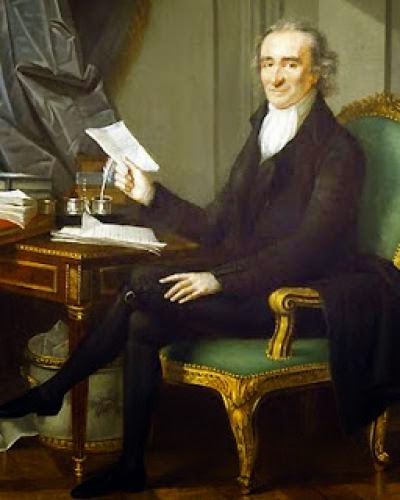
THE FILTHY LITTLE ATHEIST... FOUNDING FATHER BY DANIELE BOLELLI
The story of his life is richer and weirder than any fiction. Among his close friends were visionary poets such as William Blake as well as political icons like Benjamin Franklin. Napoleon slept with his books by his pillow, and told him statues of gold should be erected to him in every city in the universe (but the admiration was not reciprocated). Thomas Edison believed him to be one of the most brilliant minds in human history. Some of his writings rank among the greatest bestsellers of the 18th century. He participated in the two revolutions (the American and the French) that changed the political face of the modern world.
During the American Revolution, George Washington used his writings to inspire his troops to remember what they were fighting for, and even suggested that no other individual had done more for the cause of American independence. John Adams stated that without his pen, Washington's military victories would have been in vain. In France, the revolutionaries invited him to join the National Convention in charge of drafting a new constitution. His unconditional love for freedom, however, made him allergic to "revolutionary" totalitarianism just as much as he was opposed to monarchic totalitarianism. So, Robespierre and his proto-fascist cronies had him arrested and sentenced to death. But the blade of the guillotine missed the date with his neck thanks to a mistake by the jailer in delivering condemned prisoners. Before the mistake was fixed, a future American president, James Monroe, intervened on his behalf and had him rescued. And another president, Thomas Jefferson, personally offered him political asylum.
The man we are speaking of is Thomas Paine.
Even though his name is relatively well known, it is not nearly as celebrated as one may imagine given such a wild, intense existence, and such a deep impact on history. Paine was after all the man who came up with the terms "United States of America," and is credited by many to be the ideological father of modern democracy. So why is his face not on the dollar bills? Why is he not hanging out with Jefferson & co. on Mt. Rushmore? Why is he not given his due among the greatest American heroes?
Paine's problem is that he didn't die in 1792. Had he done that, his place among the pantheon of beloved founding fathers would have been assured. But instead he lived, and wrote another book entitled "The Age of Reason". The result? By the time he actually died in 1809, only six people attended his funeral. The most repeated of his obituaries by the newspapers read, "he had lived long, did some good and much harm." His supporters found themselves under relentless attacks. Thomas Jefferson's political opponents had a field day using over and over his friendship with Paine against him. Abraham Lincoln's friends burned a booklet he had written, in which he defended Paine's ideas, for fear that this would irreparably ruin his reputation. Over a hundred years after Paine's death, Theodore Roosevelt still referred to him as a "filthy little atheist."
What exactly was it about "The Age of Reason" that transformed Paine into a ghost among the founding fathers? Why did he turn overnight from popular hero into a hated villain? It's because the man took on organized religion with a furor, in an age when doing so was neither fashionable nor conducive to good health.
As he wrote, "I do not believe in the creed professed by the Jewish church, by the Roman church, by the Greek church, by the Turkish church, by the Protestant church, nor by any church that I know of. My own mind is my own church. All national institutions of churches... appear to me no other than human inventions, set up to terrify and enslave mankind, and monopolize power and profit."
When he had composed passionate defenses of freedom against political tyranny, the masses had loved him. But now that he had composed a passionate defense of freedom against religious tyranny, they hated him. Paine hadn't changed. It's simply that his audience was much readier to attack political rather than religious institutions. But for Paine tyranny was tyranny regardless which adjective was attached to it. To him, sworn enemies like the king of England and Robespierre, the pope and Martin Luther were but different faces of the same evil. Whether they called themselves monarchists or revolutionaries, Catholics or Protestants, whether they indulged in inquisitions or guillotines, didn't matter much since they were all equally addicted to totalitarianism. "The Age of Reason" was Paine's declaration of war against the religious dogmatism that had squashed individual liberties over the centuries.
The fame of being a godless atheist followed Paine like a shadow forever afterwards. But the punch line in all of this is that Paine was anything but an atheist. It was precisely because he believed in God that he despised organized religions since-in his view-these turned the divine mystery into bad mythology, and projected onto God their own psychotic hopes and fears. In Paine's brand of freedom-loving spirituality, God was something greater than any religion. And this was the belief that cost Paine his place of honor among the founding fathers.
"The above is an excerpt from the new Disinformation title" 50 Things You're Not Supposed To Know: Religion, "authored by Daniele Bolelli".







